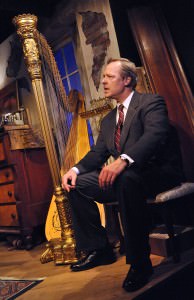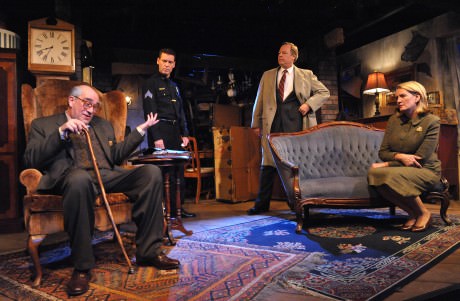The price of used furniture is nothing but a viewpoint. Much like the conflicting viewpoints caught between two estranged brothers after sixteen years of not speaking to one another. You’ll find plenty of viewpoints wrapped up in this drama as Bay Theatre Company closes out their season with Arthur Miller’s The Price. Directed by Steven Carpenter, this drama drives home the importance of familial binding ties when two brothers who have not spoken in over a decade cross paths in the attic of their childhood home. What ensues is a tightly wound emotional purge of past wounds and broken family bonds; drawing you into the Franz family darkness with a gripping reality that is easily applicable to the collective everyman family. A solid and engaging piece of emotional acting in a tight cast of four talented actors does Miller’s work a great justice.

Set Designer Ken Sheats and Properties Designer JoAnn Gidos craft an intricately detailed reality from Miller’s work. The attic space is sprawling yet confined; a juxtaposition of space crowded but not cluttered with remnants of a life gone by. Sheats designs a layout for the attic that gives the illusion of more space than there actually is, creating paths for meandering through the stacks of old furniture and doorways and staircases that lead down into the brownstone. Gidos fills the space with an almost innumerable amount of things one would expect to find in an untouched fully furnished attic in 1968; the most stunning piece of all being the enormous golden harp in the far corner, looking like something that fell straight down from Jack’s beanstalk. Together Sheats and Gidos create Arthur Miller’s world in such a way that it serves as a transient vessel for the play’s main action.
Director Steven Carpenter allows the action of the first act to drag just enough to make it feel sluggish and off-putting. While there is a great deal of expositional buildup in Miller’s text the delivery of this scene feels delayed, the characters moving too slowly through their interactions. It isn’t until the second act that the pace picks up and really grips at the audience, inviting them to keep pace with the confessions and emotional outbursts of the characters in an engaging manner.
Tempering this dramatic play with bouts of comic relief is Gregory Solomon (Conrad Feininger). The slightly cheeky gravely old man brings a lighthearted sense of existence to the heavier emotional tensions of Victor and Walter’s characters. Feininger is not without his harrowing moments of emotional expression and these are delivered with such stark contrast to his blustering windbag approach to his comedy that the audience is treated to two completely different characters. Feininger’s character has a boisterous if nervous personality that clashes like oil and water against both of the brothers and his general understanding of disruptive comic timing makes his character that much more amusing.
Esther (Kathleen Ruttun) is A character with a perpetual desperation that is ever present, be it for resolution with her husband or to be the arbitrator between her husband and his brother. Ruttun avoids the traps of the stereotypically whiny weak female character that so often find themselves living in Miller’s works and takes a much bolder approach to this sense of desperation, laying it out with a firm hand and tone of voice. There are moments of sharp conflict that fall between Ruttun and Victor’s character where she catches a hint of sparked enthusiasm and blazes with it, driving the momentum of their arguments. Her tactics in regards to bickering tend to be a bit redundant, increasing the speed and pitch at which she talks, but overall this works for the character as it needles away at Victor’s indecisive uncertainty.
Victor (Peter Wray) spends the majority of the production clashing up against an emotional glass ceiling. Wray spins his tires in the emotional mud, attempting to build a true catastrophic explosion of anguish and desperation, anger and resentment but always seems to fall just short of this climax. His emotions are mismatched especially in the intense arguments against Walter’s character and it often feels as if he is lost in the mire of feelings he’s trying to identify. Wray does have an extremely strong redeeming moment of emotional expression very late in act two where he finally breaks through and a volcano of things comes spewing forth from inside of him not just vocally but physically; releasing a show’s worth of restrained tension into one solitary moment.
Walter (Nigel Reed) is a twisted and tormented soul that blazes a trail of raw emotions through the second half in a most unfettered and chaotic manner. Reed grounds this dynamic character in his emotional outbursts, trying desperately to keep it together as calm and collected individual. But from the moment he arrives on the stage it is more than evident that under that cool exterior is a volatile explosion waiting to erupt. The tensions of 16 years nearly dissolve in nervous laughter and attempted reminiscence when Reed and Wray first begin their interactions but the mounting tension that is building under the surface is made palpable through Reed’s pauses and covert glances around the room, trying to avoid his brother’s eyes.
Reed is the catalyst and the driving force of all the action in the second act, burning like a fireworks display on Independence day when he starts spouting off over past indiscretions. Reed approaches these emotional outbursts hard and fast with a vehement passion that really drives his character’s intentions and raw feelings home to the audience. He is driven by a sense of guilt and this translates easily into his expressive facial features. The monologue he delivers in the middle of act two gives the audience true insight to his deep heartfelt struggles and just how complex of a character he’s really portraying. Reed’s final moment of confession is loaded with decades of frustration and resentment, blasting these emotional truths with a fully engaged body and voice; a performance that is simply stunning and incredibly realistic.

It’s worth the emotional struggle, knowing that much like used furniture – there is always a viewpoint to be seen, always a price to be paid. Don’t miss your chance to see The Price before you find that it has become a missed opportunity of your past.
Running Time: Approximately Two hours and 15 minutes, with one intermission.
The Price plays through May 19, 2013 at Bay Theatre Company – 275 West Street in Annapolis, MD. For tickets, call (410) 268-1333, or purchase them online.




